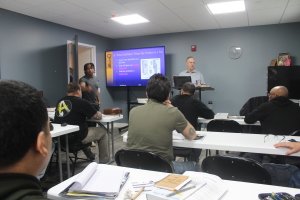Super Tuesday: It's All About Ohio
As voters in 10 states are heading to the polls this Super Tuesday, Ohio will determine, more than any other state, the current state of the Republican presidential race.
There are 437 delegates at stake Tuesday in Alaska, Georgia, Idaho, Massachusetts, North Dakota, Ohio, Oklahoma, Tennessee, Vermont and Virginia.
Mitt Romney is expected to do well in the Northeast, Massachusetts and Vermont, and in Virginia, where Ron Paul is the only other candidate on the ballot.
Newt Gingrich has a strong lead in his home state of Georgia, and election experts believe Rick Santorum will likely win Oklahoma and Tennessee (though, one recent poll shows both Gingrich and Romney closing the gap in Tennessee).
Paul is looking for his first win in three small caucus states – Alaska, Idaho and North Dakota, but is in a tough fight with Romney.
This leaves Ohio, which is a tossup between Romney and Santorum. The outcome could decide whether Santorum, who became the main challenger to Romney after Gingrich faded, can stop Romney's seemingly inevitable path to the nomination.
Ohio holds many advantages for Santorum. It has many of the types of voters that Santorum caters to – blue collar workers, evangelical Christians and those who live in rural areas. It is also a Midwestern state bordering his home state of Pennsylvania. If Santorum cannot win in Ohio, pundits reason, he is unlikely to win enough states to secure the nomination.
The overall delegate count will also be scrutinized as the election results roll in Tuesday night. All the Super Tuesday states will be awarding its delegates proportionally. This means that it is possible to win the most delegates without winning the most states.
This is both good and bad news for Romney. He has the broadest support across all the Super Tuesday states and thus, will likely expand his lead in the delegate count. But the proportional allocation also means that he may not be able to accumulate enough delegates to quickly secure the nomination, and the race may not be decided until late June or during the Republican convention in August.
"Whatever the details, these proportional allocation schemes virtually ensure that no candidate will score the kind of knockout blow that John McCain did on Super Tuesday four years ago," political scientist William Galston wrote for The New Republic Monday.





























